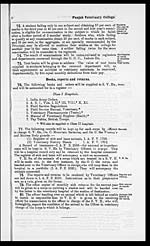Medicine - Veterinary > Civil Veterinary Departments > Army regulations, India - Veterinary > Veterinary [1909]
(34) Page 10
Download files
Individual page:
Thumbnail gallery: Grid view | List view

Glanders and Farcy Act,—Appendix I. 10
Appendix I.
(Referred to in para. 43.)
Glanders and Farcy Act (No. XIII of 1899).
Whereas it is expedient to consolidate and amend the law relating to glanders
and farcy ; It is hereby enacted as follows :—
Short title,
extent and
commence-
ment.
1. (1) This Act may be called the Glanders and Farcy Act, 1899 ;
(2) It extends to the whole of British India ; and
(3) It shall come into force at once.
Definition of
" diseased."
2. (1) In this Act, unless there is anything repugnant in the subject or context
"diseased " means affected with glanders or farcy or any other dangerous epidemic
disease among horses which the Governor-General in Council may, by notification
in the Gazette of India, specify in this behalf either generally or in respect of any
local area.
(2) The provisions of this Act relating to horses shall apply also to asses and
mules.
Application
of Act to
local areas.
3. The local Government may, by notification in the local official gazette, apply
this Act, or any provision of this Act, to any local area, to be specified in such
notification, within the province.
Local
Government
to appoint
Inspectors.
4. (1) When this Act has been so applied to a local area, the local Government
may, by notification in the local official gazette, appoint such persons as it thinks
fit to be inspectors under this Act and to exercise and perform, within the whole of
the local area or such portions thereof as it may prescribe, the powers conferred
and the duties imposed by this Act on such officers.
(2) Every person so appointed shall be deemed to be a public servant within
the meaning of the Indian Penal Code.
Power of
entry and
search.
5. Within the local limits for which he is so appointed, any such inspector as
aforesaid may, subject to such rules as the local Government may make in this
behalf, enter and search any field, building or other place for the purpose of ascer-
taining whether there is therein any horse which is diseased.
Power of
seizure.
6. Within such limits as aforesaid, the inspector may seize any horse which he
has reason to believe to be diseased.
Horse to be
examined by
veterinary
practitioner.
7. (1) On any such seizure as aforesaid, the inspector shall cause the borse
seized to be examined as soon as possible by such veterinary practitioner as the
local Government may appoint in this behalf :
Provided that, when the inspector is also a veterinary practitioner so appointed,
he may make the examination himself.
(2) For the purposes of the examination the veterinary practitioner
may submit the horse to any test or tests which the local Government may
prescribe.
Horse to be
destroyed if
found
diseased.
8. (1) If the veterinary practitioner certifies in writing that the horse is dis-
cased, the inspector shall cause the same to be immediately destroyed:
Provided that, in the case of any disease other than glanders or farcy,
horses certified to be diseased as aforesaid may, subject to any rules which the
local Government may make in this behalf, be either destroyed or otherwise treated
or dealt with as the veterinary practitioner may deem necessary.
(2) If after completing the examination, the veterinary practitioner does not
certify that the horse is diseased, the inspector shall at once deliver the same to
the person entitled to the possession thereof.
Disinfec-
tion.
9. (1) When any diseased horse has been in any building, shed or other enclosed
place, or in any open lines, the inspector may issue a notice to the owner of the
building, shed, place or lines, or to the person in charge thereof, directing him to
have the same disinfected and the internal fittings thereof or such other
things found therein or near thereto, as the local Government may by rule
prescribe, destroyed.
(2) On the failure or neglect of such owner or other person as aforesaid to
comply with the notice within a reasonable time, the inspector shall cause the
building, shed, place or lines to be disinfected and the fittings or other things to be
destroyed, and the expense (if any) thereby incurred may be recovered from the
owner or other person as if it were a fine.
Owner of
horse to give
notice.
10. The owner or any person in charge of a diseased horse shall give immediate
information of the horse being diseased to the inspector or to such authority as the
local Government may appoint in this behalf.
Removal of
horse in-
contact,
forbidden.
11. No person in charge of any horse which has been in the same held, building
or place as, or in contact with a diseased horse, shall remove such horse except in
good faith for the purpose of preventing infection, or under a license to be granted
by the inspector and subject to the conditions of the license.
Set display mode to: Large image | Zoom image | Transcription
Images and transcriptions on this page, including medium image downloads, may be used under the Creative Commons Attribution 4.0 International Licence unless otherwise stated. ![]()
| India Papers > Medicine - Veterinary > Civil Veterinary Departments > Army regulations, India - Veterinary > Veterinary [1909] > (34) Page 10 |
|---|
| Permanent URL | https://digital.nls.uk/75518742 |
|---|
| Shelfmark | IP/FA.43 |
|---|---|
| Additional NLS resources: | |
| Description | Volume VIII of the series "Army regulations, India". Contain detailed instructions about officers, hospitals, contagious and infectious diseases, troop movements, attendance on chargers, training of regimental establishments, army veterinary schools, books, reports and returns, fees and allowances, supplies and school syllabi. Includes indexes. |
|---|---|
| Attribution and copyright: |
|




